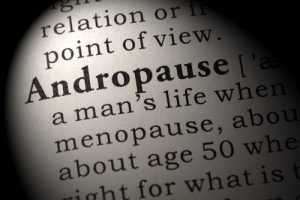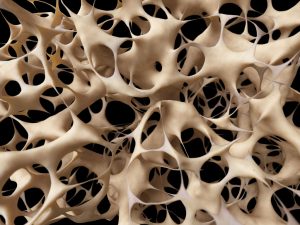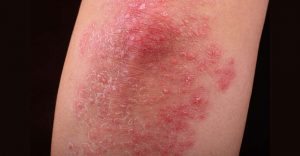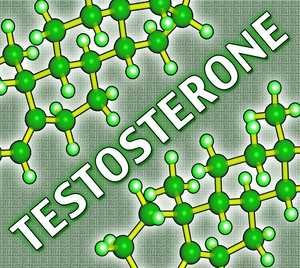Video Link: https://vimeo.com/293545818
Video Download: Click Here To Download Video
Video Stream: Click Here To Stream Video
Testosterone Deficiency has a big impact on male health, and, like most hormonal deficiencies, Low-T leads to a full spectrum of related symptoms. Among the most well-known signs of Testosterone Deficiency are low sex drive, fatigue, and depression.
These aren't the only symptoms, however, and knowing a greater range of symptoms can help you recognize your need for treatment more quickly.
 Andropause not only affects sex, energy levels, and psychological well-being, but it can also impact body fat distribution, cognitive health, cardiovascular health, and the strength of your bones.
Andropause not only affects sex, energy levels, and psychological well-being, but it can also impact body fat distribution, cognitive health, cardiovascular health, and the strength of your bones.
If you feel that Testosterone Deficiency may be suppressing your ability to live and enjoy your life, it is simple and easy to get tested for Low-T.
A physical and blood test provides all of the information needed to assess your Testosterone Levels. Let's discuss some of the less well-recognized symptoms of Low-T.
Testosterone Deficiency Saps Bone Density
One of the most insidious symptoms of Low-T is that it reduces your bone mineral density, putting you more at risk for osteoporosis, bone fractures, and breaks. Less Testosterone leads directly to weaker bones.
The scary thing about this is that Osteoporosis isn't easily diagnosed until you actually break a bone. Studies have shown that Testosterone Replacement Therapy can reduce the risks associated with Osteoporosis, giving you stronger and healthier bones.
and healthier bones.
In one study, published in the American Journal of Physiology-Endocrinology and Metabolism, doctors provided a 12-month regimen of Bio-Identical Low-T Treatment to males sixty years and older with Low-T.
After a year of treatment, the men were found to have stronger bones, including in the two areas that put men most at risk — the hip bone and the bones of the lower spine.
Researchers are just beginning to understand how Testosterone interacts with the human bone structure. It appears that Testosterone encourages a process known as Bone Remodelling, in which structures known as osteoblasts take minerals and cycle them back into healthy bone.
Testosterone, Stroke, and Heart Attack
There has been a lot of debate regarding how Testosterone Therapy affects cardiovascular health and impacts the risk of myocardial infarctions and stroke.
A huge study released in 2015 showed that there were no significant negative  effects associated with Testosterone Treatment as related to the heart and that Testosterone Replacement may actually reduce the risk of many dangerous cardiovascular events.
effects associated with Testosterone Treatment as related to the heart and that Testosterone Replacement may actually reduce the risk of many dangerous cardiovascular events.
Men with Low-T are more likely to experience a heart attack, stroke, and other heart-related health issues.
A survey of medical literature released in Andrology in the fall of 2014 analyzed data from a decade of over fifty studies and found that Low-T was strongly associated with early mortality and heart-related health issues.
Testosterone, Numbness, and Nerve Damage
Low Testosterone Levels, and conditions related to Low-T such as chronic pain and diabetes, are associated with peripheral nerve damage.
Many other conditions and events can lead to nerve damage, including physical trauma and cancer treatment. There is growing evidence that Testosterone Replacement Therapy with Creams, Gels, or Injections can alleviate symptoms associated with nerve pain and nerve damage and may even encourage the healing process.
Men with Diabetes, in particular, have been found to benefit greatly from Andropause/Low-T Treatment.
Testosterone Deficiency and Skin Health
One area which is rarely discussed with regard to Low-T is skin health. Men that have physiologically low levels of Testosterone are more likely to experience problems with existing skin conditions like dermatitis and psoriasis, and men, in general, are more likely to experience dry and cracked skin.
In a study released by The Journal of Dermatology in 2015, scientists evaluated male patients with psoriasis and organized them based on their Testosterone Levels.
They discovered that males that suffered from psoriasis were more likely to have  suppressed Testosterone Levels than men with adequate or naturally high Testosterone Levels.
suppressed Testosterone Levels than men with adequate or naturally high Testosterone Levels.
This could be because health issues related to inflammation generally lead to increased cortisol production, which encourages Estrogen production and suppresses Testosterone Levels.
Testosterone Deficiency, Obesity, and Weight Loss Struggles
There is a powerful connection between obesity and Testosterone Deficiency. This is also true for patients that are simply overweight.
It is believed that Low-T naturally encourages the body to preserve body mass, and it is also true that putting on the pounds inhibits your body's ability to maintain homeostatic Testosterone Levels. Adipose fat cells are the male body's primary means to produce Estrogen.
This means that men that are overweight produce too much Estrogen, which suppresses Testosterone Levels and encourages further weight gain.
Males that have tried exercise and diet but have found little benefit in spite of their best efforts would be smart to get their Testosterone Levels checked because Low-T could be what is preventing them from dropping the pounds.
One particular study released by Obesity Research and Clinical Practice in the summer of 2014 followed 181 men that were significantly overweight. While  taking Low-T Treatment, these males lost an average of 47 pounds. Testosterone HRT also benefitted the patients in other ways—It improved their cholesterol profile, reduced blood pressure, and normalized blood sugar.
taking Low-T Treatment, these males lost an average of 47 pounds. Testosterone HRT also benefitted the patients in other ways—It improved their cholesterol profile, reduced blood pressure, and normalized blood sugar.
Testosterone may not only help men lose weight but protect them from diabetes and insulin resistance as well.
Testosterone, Cognitive Capacity, and Memory
One recently analyzed issue related to Low-T is cognitive insufficiency. There is growing evidence that Low Testosterone Levels are related to inhibited cognitive ability and mental fogginess.
Furthermore, Testosterone Therapy appears to ameliorate cognitive issues related to Low-T, which may even relate to Alzheimer's, though much more research will need to be done.
Researchers released data analysis in the Journal of Clinical Endocrinology and Metabolism regarding aging men that took part in the Concord Health and Ageing in Men Project.
They discovered that men with Less Testosterone were more likely to experience memory issues than their peers. There is also evidence that Low-T can inhibit hand-eye coordination, based on data from Supportive Care in Cancer, August 2014.
Men with prostate cancer take drugs to greatly suppress Testosterone Production, and while their T-Levels were down, visual-motor coordination was found to be significantly lower than it was prior to treatment.
found to be significantly lower than it was prior to treatment.
Testosterone Deficiency is a complex and multifaceted disorder. If you feel that Low-T may be impacting your health and wellness, reach out to a medical professional for blood testing and evaluation.
Testosterone Replacement Therapy may be able to seriously change your life.
Contact Us Today For A Free Consultation

- Andropause Symptoms Treatment - Fixing Male Menopause - Video [Last Updated On: November 25th, 2024] [Originally Added On: July 12th, 2012]
- Andropause: Male Menopause - Video [Last Updated On: November 25th, 2024] [Originally Added On: July 12th, 2012]
- About Andropause - Video [Last Updated On: November 25th, 2024] [Originally Added On: July 12th, 2012]
- MALE MENOPAUSE, MANOPAUSE, OR ANDROPAUSE? - Video [Last Updated On: November 25th, 2024] [Originally Added On: July 12th, 2012]
- Andropause Menopause Symptoms and Solutions Testosterone - Video [Last Updated On: November 25th, 2024] [Originally Added On: July 12th, 2012]
- Treatments for Male Menopause/Andropause/Manopause/Testosterone Deficiency - Video [Last Updated On: December 20th, 2024] [Originally Added On: July 12th, 2012]
- What is testosterone deficiency syndrome/male menopause/.andropause - Video [Last Updated On: November 25th, 2024] [Originally Added On: July 12th, 2012]
- Testosterone Deficiency Syndrome/Andropause - Video [Last Updated On: December 20th, 2024] [Originally Added On: July 12th, 2012]
- John Crisler DO - Andropause [Last Updated On: December 20th, 2024] [Originally Added On: July 12th, 2012]
- Menopause/Andropause [Last Updated On: December 20th, 2024] [Originally Added On: July 12th, 2012]
- Male Andropause: Part 2 - Video [Last Updated On: December 20th, 2024] [Originally Added On: July 12th, 2012]
- Dr. Steven Jepson discusses Andropause - Video [Last Updated On: December 20th, 2024] [Originally Added On: July 12th, 2012]
- Maturitas publishes clinical guide on low-dose vaginal estrogens for vaginal atrophy [Last Updated On: January 10th, 2018] [Originally Added On: September 13th, 2012]
- Testosterone Deficiency in Men - Andropause Symptoms and Treatment - Video [Last Updated On: January 4th, 2025] [Originally Added On: November 2nd, 2012]
- Andropause - The Male Menopause - Video [Last Updated On: January 3rd, 2025] [Originally Added On: November 2nd, 2012]
- SA STGEC ~ Ad Hoc Talk: Andropause (2006) - Video [Last Updated On: January 4th, 2025] [Originally Added On: November 2nd, 2012]
- The Cosmetic Medic Stamford CT - Video [Last Updated On: January 5th, 2025] [Originally Added On: November 2nd, 2012]
- Testosterone Roundtable -- Overview of Low Testosterone (Part 1) - Video [Last Updated On: January 5th, 2025] [Originally Added On: November 2nd, 2012]
- Naturally Increase Testosterone Levels - Video [Last Updated On: February 8th, 2025] [Originally Added On: November 26th, 2012]
- Patients Medical Welcomes Dr. Marcia A. Harris, Holistic Gynecologist and Anti-Aging Physician [Last Updated On: June 7th, 2025] [Originally Added On: December 2nd, 2012]
- ALCAT Pioneer, Roger Deutsch, to Address "Food Induced Inflammation and Aging" at Vienna's Prestigious December ... [Last Updated On: June 8th, 2025] [Originally Added On: December 5th, 2012]
- Andropause: Changes in Aging Men - Video [Last Updated On: February 19th, 2025] [Originally Added On: December 10th, 2012]
- Rhein Test Kit - Avante Medical Center - Video [Last Updated On: February 19th, 2025] [Originally Added On: December 10th, 2012]
- AM Northwest Appearance - Andropause - Video [Last Updated On: February 19th, 2025] [Originally Added On: December 10th, 2012]
- Lessons in Menopause for Men - Video [Last Updated On: December 15th, 2012] [Originally Added On: December 15th, 2012]
- AAG Health Publishes Testosterone and HGH Discussion-Blog [Last Updated On: June 11th, 2025] [Originally Added On: December 26th, 2012]
- Understanding Andropause: Erectile Dysfunction - Part Two - Video [Last Updated On: February 26th, 2013] [Originally Added On: February 26th, 2013]
- Airing March 2 and 3: BBC World News 30-Minute Segment on Andropause/Aging with Dr. Jeff Life, Healthy Aging Expert ... [Last Updated On: February 26th, 2025] [Originally Added On: February 28th, 2013]
- Andropause - Great Android App For Men - Vigor - Stamina - Video [Last Updated On: February 28th, 2013] [Originally Added On: February 28th, 2013]
- Eastday-Survey finds 1m locals suffer from andropause [Last Updated On: August 23rd, 2025] [Originally Added On: May 22nd, 2013]
- What Is Andropause?Diagnosis,Symptoms,Treatment [Last Updated On: March 11th, 2025] [Originally Added On: July 2nd, 2013]
- Andropause - Video [Last Updated On: July 2nd, 2013] [Originally Added On: July 2nd, 2013]
- Andropause Glossary - Video [Last Updated On: July 2nd, 2013] [Originally Added On: July 2nd, 2013]
- Andropause Symptoms - Video [Last Updated On: July 2nd, 2013] [Originally Added On: July 2nd, 2013]
- Understanding Andropause: Erectile Dysfunction - Part One - Video [Last Updated On: July 2nd, 2013] [Originally Added On: July 2nd, 2013]
- Understanding Andropause - Video [Last Updated On: July 2nd, 2013] [Originally Added On: July 2nd, 2013]
- Andropause video - Video [Last Updated On: July 8th, 2013] [Originally Added On: July 8th, 2013]
- ANDROPAUSE SOLUTION "OSS-TEST" TOP BEST NATURAL TESTOSTERONE BOOSTER - Video [Last Updated On: August 3rd, 2013] [Originally Added On: August 3rd, 2013]
- Natural relief for andropause [Last Updated On: December 2nd, 2017] [Originally Added On: October 10th, 2013]
- Andropause - Causes, Symptoms, Treatment, Diagnosis - Seniors ... [Last Updated On: January 7th, 2018] [Originally Added On: November 3rd, 2013]
- Andropause - Causes, Symptoms, Treatment, Diagnosis - Men's Health ... [Last Updated On: December 31st, 2017] [Originally Added On: November 3rd, 2013]
- Andropause Specialist [Last Updated On: January 21st, 2018] [Originally Added On: November 10th, 2013]
- Understanding Andropause [Last Updated On: October 24th, 2015] [Originally Added On: November 10th, 2013]
- Andropause - Causes, Symptoms, Treatment, Diagnosis - Men's ... [Last Updated On: January 20th, 2018] [Originally Added On: November 18th, 2013]
- Andropause | Male Menopause | Male Menopause Symptoms | Male ... [Last Updated On: November 25th, 2018] [Originally Added On: November 18th, 2013]
- Symptoms of andropause - Men's health [Last Updated On: November 25th, 2018] [Originally Added On: November 21st, 2013]
- Andropause In Men [Last Updated On: December 9th, 2017] [Originally Added On: November 23rd, 2013]
- Andropause - Male Menopause - Androgen Replacement Therapy [Last Updated On: January 13th, 2018] [Originally Added On: November 25th, 2013]
- Andropause 2013 - Reviewed and Ranked - Independent Reviews on ... [Last Updated On: March 30th, 2025] [Originally Added On: November 25th, 2013]
- Andropause, Facts, Symptoms, Diagnosis, Testosterone Treatment [Last Updated On: January 18th, 2018] [Originally Added On: November 27th, 2013]
- Symptoms of Andropause (Male Menopause): Low Testosterone, Low ... [Last Updated On: December 13th, 2017] [Originally Added On: November 27th, 2013]
- Discovery Health "Andropause: Dealing With Male Menopause" [Last Updated On: December 5th, 2017] [Originally Added On: November 27th, 2013]
- Global Toronto's News at Noon Andropause aka "manopause" - Video [Last Updated On: November 27th, 2013] [Originally Added On: November 27th, 2013]
- San Diego Dermatologist Discusses Male Menopause | Andropause Expert in San Diego - Video [Last Updated On: December 7th, 2017] [Originally Added On: December 9th, 2013]
- The American Academy of Anti-Aging Medicine (A4M) Concludes Largest Event in Anti-Aging, Regenerative and Aesthetic ... [Last Updated On: April 5th, 2025] [Originally Added On: December 19th, 2013]
- Andropause Symptoms - Male Menopause Symptoms [Last Updated On: December 16th, 2017] [Originally Added On: December 27th, 2013]
- What Is Andropause? | eHow - eHow | How to Videos, Articles ... [Last Updated On: January 20th, 2018] [Originally Added On: December 30th, 2013]
- Drug companies are pushing that new-man feeling Low T, high stakes [Last Updated On: April 10th, 2025] [Originally Added On: January 16th, 2014]
- Andropause - Male Menopause - Androgen Replacement Therapy ... [Last Updated On: December 24th, 2017] [Originally Added On: January 16th, 2014]
- Male Menopause Symptoms, Treatments, Causes, and More [Last Updated On: January 15th, 2018] [Originally Added On: January 16th, 2014]
- Can you reverse the aging process? [Last Updated On: April 11th, 2025] [Originally Added On: January 17th, 2014]
- Yourwellness Magazine Explores Male Menopause [Last Updated On: April 12th, 2025] [Originally Added On: January 19th, 2014]
- Antiaging Medicine and Research, India Will Highlight “Hormones and Aging in Medical Practice” During 5th Indomedicon ... [Last Updated On: April 14th, 2025] [Originally Added On: January 24th, 2014]
- Care needed when controlling cholesterol [Last Updated On: October 23rd, 2020] [Originally Added On: January 27th, 2014]
- Symptoms of Andropause (Male Menopause): Low Testosterone ... [Last Updated On: October 11th, 2020] [Originally Added On: January 30th, 2014]
- Antiaging Medicine and Research, India Will Highlight Hormones and Aging in Medical Practice During 5th Indomedicon ... [Last Updated On: October 24th, 2020] [Originally Added On: January 31st, 2014]
- The truth about low testosterone and 'male menopause' [Last Updated On: October 31st, 2020] [Originally Added On: January 31st, 2014]
- Surge or shrink [Last Updated On: November 1st, 2020] [Originally Added On: February 11th, 2014]
- How Does Andropause Affect Men? - Video [Last Updated On: November 10th, 2020] [Originally Added On: February 14th, 2014]
- Andropause | Male Menopause | Male Menopause Symptoms ... [Last Updated On: November 25th, 2018] [Originally Added On: February 15th, 2014]
- NuMale Medical - Low Testosterone -- Andropause - Video [Last Updated On: October 21st, 2020] [Originally Added On: February 21st, 2014]
- Boost Your Sex Drive: Solutions For Impotence, Erectile Dysfunction And Low Libido [Last Updated On: September 18th, 2025] [Originally Added On: February 27th, 2014]
- HowStuffWorks "Andropause: Dealing With Male Menopause" [Last Updated On: October 16th, 2020] [Originally Added On: March 7th, 2014]
- The Truth About Andropause: Male Menopause - Explained by Hormone Expert, Dr. Ken G. Knott, MD - Video [Last Updated On: November 20th, 2020] [Originally Added On: March 7th, 2014]
- What Is Andropause? It's Symptoms In Men & Treatment ... [Last Updated On: November 11th, 2020] [Originally Added On: March 14th, 2014]
- Andropause Low Testosterone A Drug Free Natural Approach UnitedMulticare com - Video [Last Updated On: October 9th, 2020] [Originally Added On: March 15th, 2014]
- Low Testosterone (Andropause). What is it? - Video [Last Updated On: October 30th, 2020] [Originally Added On: March 15th, 2014]
- Male menopause is a reality [Last Updated On: October 13th, 2020] [Originally Added On: March 24th, 2014]
- Anatomy Menopause Andropause - Video [Last Updated On: March 25th, 2014] [Originally Added On: March 25th, 2014]
- Menopause & Andropause - Video [Last Updated On: November 7th, 2020] [Originally Added On: March 30th, 2014]
Word Count: 1058




















